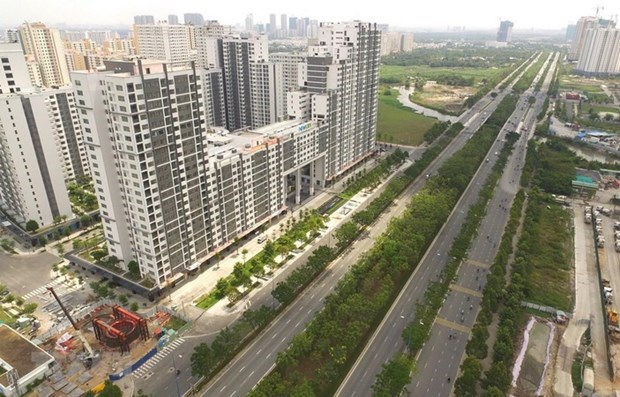 |
|
|
Dinh told a forum held on January 6 that the COVID-19 pandemic affected the real estate sector, causing weakening demand in the market. In early 2020, the market was frozen. The Government has taken many measures to untie the sector’s difficulties such as the promulgation of legal regulations for condotel development. However, legal obstacles have hindered supply, creating double difficulties for the market.
In the second half of the year, although there were two waves of the pandemic, the property market still showed strong growth as there were 60,000 new housing products supplied to the market, equivalent to 67.5 percent compared to 2019. The market has recorded impressive numbers as the absorption rate in HCM City reached over 80 percent, while prices in many localities increased. Tourism real estate still increased strongly despite the pandemic.
“2021 will not have a risk of a virtual crisis or a bubble, but develop sustainably. Infrastructure projects with good business opportunities will become attractive forces. Real estate investment will spread to mountainous areas. In addition, the bank interest rates that could be maintained at 2020's levels will lead to stronger investment stimulus,” he added.
Finally, movements from the Government in 2021 would remove difficulties for the market. Stronger FDI inflows would be the impetus in the real estate market next year.
Nguyen Tho Tuyen, chairman of BHS Group, said property prices would continue to rise in 2021.
“Real estate prices are a “marriage” between supply and demand. While the supply is very scarce, foreign investors enter the market with billions of dollars in deals in Hanoi and HCM City. In terms of demand, individual investors pouring money into the market even exceeded 30 per cent as mentioned in some studies,” he said.
In particular, at present, big investors in the market, mainly from Hanoi and HCM City, are in a state of capital preservation. They made big profits and withdrew from Da Nang, Nha Trang and Phu Quoc markets before the market plunged. Their capital is waiting to be invested.
Trinh Van Quyet, FLC Group’s chairman, said in the 2011-12 period, the real estate market entered a period of oversupply. 2020 was a crisis of supply shortage. However, in the last five months of last year, the market witnessed many positive signs.
Taking the example of FLC's project in Ha Long, all apartments with unfavourable locations out of 2,500 shophouse apartments were sold with prices rising by 50 per cent. Inventory was completely liquidated. Investors think the worst is over.
However, experts all agreed that institutions are still the biggest bottleneck blocking the growth of the real estate market. Legal documents such as the Land Law, Construction Law and Investment Law have not kept up with market development requirements.
Le Hoang Chau, chairman of HCM City Real Estate Association (HoREA), said legal bottlenecks should be removed for real estate development in Vietnam, because all firms want a fair, open and healthy business environment.
‘The year 2020 marked a strong change in the construction of the legal mechanisms when the revised investment law and construction law were passed, solving many difficulties,” he said.
“I think that the property market in 2021 will continue to develop because Vietnam has controlled the COVID-19 pandemic. The Vietnamese economy also saw positive growth. Next year, the Ministry of Construction will focus on revising the Housing Law, and some decrees on old condominiums to facilitate businesses participating in the development of this type of housing. But we should also pay attention to legal risk prevention and control in the financial sector, as well as corporate credit,” he added.
Dang Hung Vo, former deputy minister of Natural Resources and Environment, warned that if management is not good, it will cause bubbles in the market. At this time, many real estate providers are in stock, but are waiting for prices to increase in the next few years.
“In 2021, revising laws to fill gaps and get rid of overlapping rules is the most important thing we need to do,” he added./.VNS

Retail property market saw many changes in 2020 due to pandemic: Savills
The COVID-19 pandemic caused retail revenue to drop sharply in 2020, impacting the domestic retail property market, according to Savills Vietnam.

Impressive growth seen across real estate
While the pandemic has affected nearly every business, Vietnam’s real estate sector has seen significant movements throughout the year.